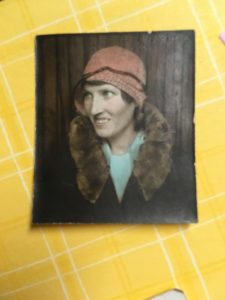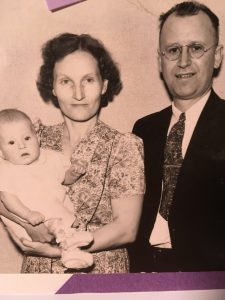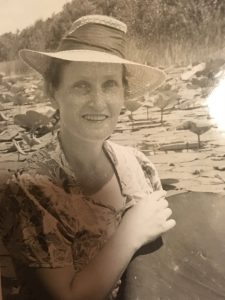
The face of a Native American, sad and contemplative, stares at me from the back of the wooden rocking chair I am walking towards. The dark wood looks fragile but holds weight with a steady balance. “There used to be horses and carriages”: those words have come to me from the chair’s mouth in a few surreal dreams. But in reality, they were spoken by my great grandmother while she sat in that old rocker. I believe my response was along the lines of “that must have been back in the medieval times.” My childish contraction of all history to a single period made my great grandmother chuckle. But indeed, she grew up in the early 20th century instead of the 13th. And although I was far too young to understand thatshe had a childhood let alone be interested in it, her life proved to be compelling and magnificent. Clara Loecker lived through the Great Depression, raised three children, one without his biological father, and lived to see all of her great grandchildren’s birthdays.
Born in 1910 in Wynott Nebraska, Clara Loecker was the third of the five children her mother birthed. Unfortunately, after both her older sisters died in infancy, Clara Loecker became the oldest of three. Her father owned a small farm and worked hard. Still, he was barely able to feed his family. Her mother reared her three children as best she could. Because of the financial troubles the family faced, Clara was often sent to help anybody in Wynott who needed an extra hand and could afford an extra mouth. She served as a maid to help pregnant or old women. She served as a nurse and nanny for women in labor or newly out of it. She was often sent to live with other families so that her own could have an easier time. Industrious from a young age she earned the reputation of being helpful and worth the board and room. Eventually, some time after she graduated from 8th grade, she found herself thrust into motherhood herself.
Olan Mills was a friend of Joe Loecker, Clara’s brother. And when he began romancing Clara is a secret much like most early life non-marital relationships. Clara, being catholic, likely believed that she and Olan were going to get married. He may have even told her this. But when the time came, because my grandmother’s brother Don Loecker was soon to be born, Olan abandoned the relationship. Clara, to avoid shaming her family, went the 51 miles from Wynot, Nebraska, to Sioux City, Iowa. There she worked at a home for unwed mothers and eventually birthed her own child.
Ronald (Don) Loecker lived a curious life. But it started in an orphanage where his mother left him to avoid telling her parents about her out-of-wedlock son. However, her would-be husband wanted to meet the child and accosted Clara’s mother in search of the baby she knew nothing about. The conversation between Olan Mill and Mrs. Loekcer was likely heated and short. But it led the mother to summon her daughter and find out what was going on. Whether they decided together, or if Clara did so out of defiance and relief at her secret being outed, Clara went to the orphanage and reclaimed him less than a year after his arrival there. Her parents took the child in and Clara went back to work in Sioux City to support the family she was just starting.
Somewhere between all the jobs she worked- at restaurants, as a child nurse, and as a nanny- Clara met and married Royale (Roy W) Troutman. Born in 1900 and living in Sioux City for several years, Royale was more than able to support a family. The two got married in 1936, right in the middle of the Great Depression and had no wedding ceremony whatsoever.

The only evidence of the special day is the marriage certificate that my grandmother still has in her basement storage. They moved into a nice house at 504 Center Street and began to live their lives together. Clara’s only child at the time also moved in with them. My grandmother calls him Uncle Don but his full name is Andrew Donald Loecker. While Royale worked as a night time security guard at the Sioux City Battery Company, Clara got a steady job as a dishwasher at the local hospital. Royale worked nights and Clara worked days. After Royale’s mother moved in with them the raising of Don became precarious.
The feud between Methodists and Catholics has died down since the early thirties but back then my grandmother tells me it was a consistent source of drama. Royale was a Methodist along with his entire family. On the other hand, Clara whole family was Catholic. Both are possessive religions wanting all children in their families to be raised under their own beliefs. So, when Royale’s mother began taking Don to a Methodist church, Clara decided it would be better for his catholic upbringing to go back and live with her parents in Nebraska. Therefore, my grandmother she was set to be the only child in the house when she was born in 1940. Unfortunately, Royale’s mother passed away a couple months before my grandmother was born. But, this did mean that Don could rejoin the family again. Then with the addition of my grandmother’s sister Carol, there were three children total. All five of them lived in the house until they moved out of Sioux city in 1945.
Just before the family could leave Sioux City, World War II began. Funny enough, when Roy volunteered he was denied because he was underweight. They told him to eat bananas. He sure ate some bananas because he was a pharmaceutical mate for the navy before the end of the war. During his service Clara began to move towards a life she would enjoy in its entirety. So, when Roy returned from his service they moved to a farm in Allan, Nebraska. Clara lived on a farm like a fish lives in the sea. She raised chickens and pigs and she planted crops on the 140 acres they owned, but Roy had no experience as a farmer; he left most the work to the expert. So, Clara happily led her life on her farm with only the knowledge she gained from her childhood to lead her.
The farm never really did very well because of poor seasons, disease, and lack of experience. However, the farm was a suitable home while it was being used. Each person had their role. Don hunted for rabbits and squirrels, so the family could eat meat. My grandmother, Marie, and her sister Carol studied and helped cook and clean. Clara and Roy worked the farm and kept the house in the unconventional equality of a women-led farm. Clara fixed the fences, planted and plowed, and worked with the animals. But, after the pigs got sick and died and Roy fell out of a tree, the Troutman family seemed to veer away from farm life.
Soon after my great grandfather’s fall, and after the Great Depression ended, the Troutman family had moved back to Sioux City. Clara Loecker went back to working jobs in a city to support her children. As her children grew up, Clara saw her family expand further. Her oldest daughter got married and sprouted her own family totaling three grandchildren and seven great grandchildren. Her second daughter’s family has two grandchildren and three great grandchildren.
By the time her life came to an end in 2006, Clara had accomplished more than most. She had met most of her grandchildren and passed on stories of her life directly to a third generation. In the end, her hard work bore fruit, her dedication brought faith, and her love for her family endeared her to all those she raised or helped to. The Great Depression was something she endured and survived, and although it shaped how she lived, she is forever an example of how the Great Depression forced people to grow as individuals. The rocking chair Clara used to sit in whenever I saw her as a child, now sits in my own home. Sometimes I sit in that chair and think about my ancestors. Now, when I sit there I will wonder how many of them were as industrious and dedicated as my great grandmother.

Works Referenced
Andersson, Jeanette. Personal Interview. January 23, 2019
Certificate of Marriage, Roy Troutman to Clara Loecker, 19 October
1936, South Sioux City, Iowa. Copy in possession of Marie Humphrey,
Rockford, Illinois.
Humphrey, Marie. Personal Interview. April 3, 2019